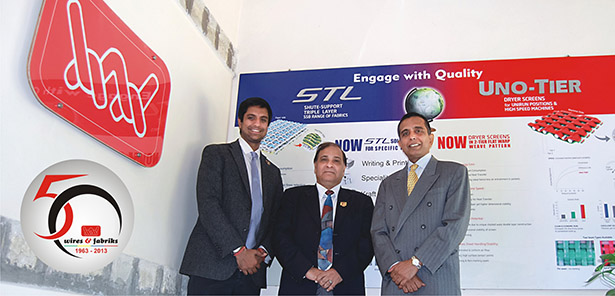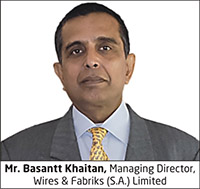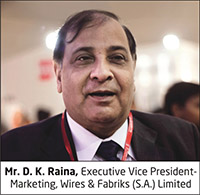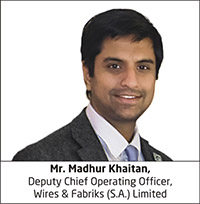Headquartered at Jaipur, Wires & Fabriks (S.A.) Limited – a leading manufacturer and supplier of paper machine clothing in India – manufactures a full range of forming fabrics, woven dryer screens and spiral link dryer screens for all types of paper machines including top-of-the-range high-speed paper machines. Over 30 per cent of its production is exported to over 25 countries around the world. The company also manufactures woven fabrics for the pulp section, where pulp is made, and effluent treatment plants, where effluents are treated and fibre is recovered. The company has an ultra modern manufacturing plant at Jaipur, which is equipped with state-of-the-art machines and equipment.
Since 1995, the company is also an important supplier of performance chemicals for paper making.
The Paper Mart team (PMT) recently interviewed three stalwarts of the company – Mr. Basantt Khaitan, Managing Director; Mr. D.K. Raina, Executive Vice President-Marketing; and Mr. Madhur Khaitan, Deputy Chief Operating Officer – to get an understanding of the company’s long journey, its successes and its core strengths and to learn about the advantages and disadvantages of joining family business.
Here are some excerpts from this candid interaction.
Paper Mart Team (PMT): Tell us about the history of your company and its major achievements.
Basantt Khaitan (BK): In 1963, our factory was founded on a 10-acre plot at Jhotwara, Jaipur, for the manufacture of phosphor bronze wire cloth for paper industry. With a built-up area of 2500 m2, the operations started in 1965.
Mr. Nathmal Khaitan and his younger brother Mr. Jankilal Khaitan had the vision to establish a hi-tech industry in their homeland – Rajasthan. For the first 10 years the industry struggled with odds to reach the break-even point. Training the completely rural labour force and finding trained engineers to run and maintain the machines were a challenge despite the presence of German engineers at the factory.
During those days, paper industry depended principally on imports to meet its needs. It was, therefore, very difficult to attract customers – those who could buy an Indian product. Fortunately, the then import-substitute-friendly government policy of high import duty and licensed imports helped in gaining customers steadily. Over time, the industry stopped relying on imports on its own.
In 1974, a sizeable long-term export order was signed with North Korea, which brought good fortune to the company. After this significant event, the company opened many more export markets.
By the late 70s, western paper mills had almost replaced bronze wire cloth with synthetic woven fabrics called forming fabrics. Now grouped under ‘technical textiles’, this was a complete change in technology – for manufacturing as well as application. In 1983, the company entered into a technical collaboration with Villforth, Germany, for machinery supplies and technical knowhow for manufacturing and application. This change resulted in a new face for the company. The considerable investments for this project necessitated heavy influx of funds, and the company decided to come up with a public issue of its shares in 1985.
The company currently has a built-up area of nearly 10,000 m2 and is equipped with state-of-the-art machinery and equipment. It has a technical collaboration with Albany International for the latest products in forming fabrics. The company has added new products to its product range: dryer screens, spiral screens and stainless steel wire mesh – all for paper industry.
Exports make up nearly 30 per cent of the company’s current turnover. New market segments like non woven, fertilisers and sludge press have been developed for linear diversification.
The company’s chemical division was started in 1995. Here the company is an exclusive distributor of specialty chemicals used in paper industry. It may be mentioned that nearly 20 per cent of the company’s revenue comes from this division.
PMT: What are your company’s success factors? Where does your company’s core strength lie?
BK: People and technology are the company’s success factors. They are also our core strengths. We always strive to keep the best people and the best available technology in our company.
D. K. Raina (DKR): Sometimes good things happen to bad companies and bad things happen to good companies. But if one plays long enough, one surely gets what one deserves. We are a 50-year-old company. Regarded as leaders on the domestic market, we are strong enough to compete with players in the global arena. This success would not have come to us without our aggressive investments in technology and people who can act as a bridge between customer expectations and our capabilities. One of the true tests of leadership is the ability to recognise a want before it becomes a need. We have always scored on this front with our ability to introduce new value-added designs and products to paper industry. This ability is one of our core strengths.
Madhur Khatian (MBK): Our success lies in our values and our ability to strengthen our process. When it comes to machinery, people or global systems, we follow defined processes – processes that ensure consistent results.
PMT: Can we regard innovation as the main factor behind your corporate success? Tell us about your recent innovations.
BK: Yes – to a certain extent. You see, being innovative is a state of mind that comes from having both a positive frame of mind and an inclination towards finding solutions on one’s own. Innovation is one of the important tools for success. The environment in which we work – the competitive environment, the customer environment and the internal work environment – is critical to innovation. As far as new products and services are concerned, we have always kept ahead of the competition. Internally, we have encouraged team-based risk-taking for continuous improvement. A preference for technology has helped us a lot in this endeavour.
DKR: I think innovation isn’t something that you “do” – it happens. It is further augmented when the enabling environment and the elements work in sync. But the most important thing here is to get off and do something – it’s as simple as that. Many have innovative ideas but few actually decide to implement them – not tomorrow, not next week, but today! We have always tried to be the first in the area of new and modern designs produced in India, be it STL forming fabrics or energy saver UNOTIER dryer screens. We need to give confidence to the team in taking their chances…to emphasise on creative thinking… to encourage sensible exceptions to the general rule.
MBK: Innovation stems from the ability to identify a need and to meet it through leading products and services. Business is done by people, and our team has a track record of launching many firsts in India, which bears testimony to our ability to innovate and our readiness to invest in technology.
PMT: Do you think your research and development wing has contributed enough towards the growth of your company?
BK: We concentrate more on development. Our raw material and machinery suppliers are mainly from Germany. Germany is regarded as a leader in technology. Our raw material and machinery suppliers carry out considerable research, and we take advantage of it by constantly interacting with them and upgrading our knowledge through training programmes and new investments. We have state-of-the-art machines for all our processes. Our intensive partnership with our key suppliers has resulted in our providing our customers with many new products and solutions.
Our team of technical people always keeps track of top-of-the-range manufacturing technology and practices, new raw materials, new products and, most importantly, new customer needs. Highly experienced and knowledgeable foreign consultants, who are also part of this core team, help us in speeding up our learning and development process.
We develop new fabric designs based on market feedback. We spend nearly 10-15 per cent of our production time on developing new products and processes. We also try to follow the worldwide principal of successful companies: “20 per cent of your sales should be from new products developed in the last two years.”
Introducing new products to the market is in our DNA. Perhaps this has been our real mantra for success and the reason why we enjoy the highest market share on the domestic market for our range of products. We are currently competing with world leaders on our home market as well as our export market. Our exports have risen steadily – at over 20 per cent per year. Customers’ trust and reliability of our products and services are the factors behind this steady rise in exports.
DKR: As BK mentioned, we stress more on development than on basic research. Our core technical team plays a great role by continuously improving the existing designs and benchmarking world standard practices and processes. All this has helped us in competing with industry players not only in India but also on global export markets. But the markets don’t take long to change their character. By the time we think we are in a position to connect the dots, someone moves them again. So the knowledge that we gain from our international collaborators and partners helps us in improving our understanding of the current state of affairs in the industry. This understanding helps us in raising our exports; it contributes immensely to the growth of our company.
PMT: How do you strike a balance between price and quality?
BK: We give immense importance to quality and work hard towards reducing costs as much as possible to achieve the desired level of quality. We do not reduce costs at the expense of quality, for it’s quality that ultimately matters. We don’t fear failures but keep learning from our mistakes and shortcomings.
DKR: We do work on value engineering and process rationalisations to reduce the cost, but quality reigns supreme in our working. The customer is the boss. He can fire anybody in our company simply by buying the product at some other place. The main challenge is to keep the customer satisfied. It’s a tough job as one has to find out first what the customer requires and then deliver the product without causing any inconvenience to the customer. So, we have to ask the right questions to get the right answers.
MBK: We don’t even talk about compromising on quality. It is cheaper to move away from businesses that do not support the price structure that is needed to sustain a quality product than to follow an inverse path and lose out. In the long run, a quality product gives you a more sustainable advantage than just ‘price’.
PMT: Tell us about your employee training programme.
BK: Our training programmes encompass all employees – from workers to the highest cadre. We attach a lot of importance to internal training. Our team is currently undergoing TPM training. It is perhaps one of the most comprehensive and time-tested practices for making an organisation sustainable, as it encompasses not just quality improvement but also productivity improvement, safety, waste reduction and much more through employee ‘participation’ rather than employee ‘direction.’ Nearly 7-10 per cent of employee time is spent on training. Changing the agriculture- and trade-based mindset of most of the people of our country to the industry- and discipline-based mindset requires untiring efforts, but the rewards are immeasurable.
Sometimes people refer to our company as a training institute, as most of the people selling paper machine clothing on the market happen to be our ex employees. We are proud that our people are amongst the best-trained in the industry.
DKR: The company runs a formal skill development and training programme for all departmental levels. In the area of marketing and tech services, we lay special emphasis on identifying the training needs of each employee. Based on their needs, our employees receive selective external training or internal training. Of course, a very exhaustive programme in TPM is already underway in our company; and all this is in addition to the in-house and on-the-job training programmes carried out by our collaborators and overseas consultants who visit us periodically. We fully understand that the new source of power is not money in the hands of a few people but information in the hands of many. This thought drives all our training and skill development programmes. According to Aristotle, “we are what we repeatedly do. Excellence, therefore, is not an act, but a habit.” This thought is the basis our training programme.
MBK: I have learnt a lot from my father. He believes that “business is done by people and we need to invest in our people to make them good enough to serve our customers’ needs in spite of the fear that they may leave us; but remember that If we don’t invest in our people, our customers will leave us, as our employees won’t be good enough to serve the needs of our customers.” Training of our employees is important, as we need to educate them about the company’s work culture, values and vision. The efforts we make to train our employees have certainly translated into productivity, a sense of belongingness and consistent results.
PMT: Tell us about ‘Disha’ – your institution for the differently challenged at Jaipur.
BK: Disha was born in 1995 out of a casual conversation with Mrs. Kavoori, a leading educationist of the city. She wanted to start an education centre for mentally-challenged children – something we didn’t have during those days. Till date, Disha has helped nearly 4,000 families in caring for their children with compassion and pride. Our company supports the institute in many ways – from management to finances. Besides running a school for nearly 180 children, Disha runs an education programme for parents, a vocational training centre for children, a physiotherapy centre and a teacher training centre.
Disha has been instrumental in persuading the state government to change and implement laws for the differently-abled people and to bring benefits to them.
PMT: What are your future targets?
BK: Our target is to nurture and affirm sustainable growth of our employees and thereby the company. In addition, we will maintain our leadership position at home while aggressively pursuing the vastly open export market.
DKR: As a company strategy we have initiated our forays into certain non-paper sectors through our Technical Textiles Division and have identified a few verticals. Within the paper industry its clear that our fortunes are linked with the paper economy and we are quite optimistic about the same for the Indian market. With drivers like higher education outlays, urbanisation, stress on packaging or branding, etc., well in place the industry, including tissue and packaging, is yet to realise its full potential. We are preparing ourselves for this growth, which is inevitable in times to come. With faster and modern machines to be added in future and printing industry modernising at a higher pace, paper markets will be more competitive and we as manufacturer of such critical inputs like machine clothings will have to constantly upgrade ourselves in technology and market operations including IT integration in all our systems. To remain leaders in our field, we feel “service & solutions” shall be the main differentiators and our plans are already on course in this direction in addition to our service offerings of CADSCAN machine surveys, Drainage studies, Down Day Dryer Surveys, etc. Exports, of course with its huge possibilities, will continue as our spearhead for growth and to establish ourselves as a reliable global player.
MBK: We aspire to make a footprint on the global map by competing with the best global players in the export arena. We will try to graduate from being a business to being an enterprise. We have 50 years of experience in running the business. We will use this experience and our ability to take our business to new heights.
PMT: What has been you role at Wires & Fabriks? Tell us about your major contributions to the company.
DKR: I have been in this company for over 20 years now. I was with Voith Fabrics for 10 years and before that I was with the BILT group, where I started my career in paper manufacturing. So, I have been able to put my experience and knowledge about the industry in general and paper machine clothings in particular to good use at Wires & Fabriks. More importantly, I have been able to use the systems and professional approach adopted by these large companies for raising this company’s efficiency and exports. Today, 30 per cent of our revenue is generated from exports. Apart from exporting our products to the neighbouring countries, we are exporting our products to over 20 other countries. We have exported our fabrics for many high-speed machines in Asia Pacific, South East Asia and the Mid East Region. All this was possible because the team at the helm of affairs had readily accepted my ideas and strategies. Needless to say, I was able to execute my ideas and strategies through good teamwork. Of course, I had the support of a vibrant technology backup from our operations. Some of my plans failed, but I was encouraged to draw up new plans. A great help in this direction came from the IT initiatives we had earlier taken in our systems and procedures. Our business may be about technology but it is equally about customer relationships. My main role has been to make such values a part of our company’s work philosophy.
PMT: It is said that we must go wherever our interests and talents take us so that we can discover our strengths and develop our skills. What brought you to Wires & Fabriks?
MBK: As Indians, it is hard to disregard our own culture and traditions. According to family-business tradition, one should use family business as a platform for further growth. If the business is small, the younger generation must make efforts to turn it into a big enterprise.
Although we are referred to as entrepreneurs, we are all actually inheritors. My grandfather started this business, but actually remained a custodian; he passed the reins of the business to his sons. Now my father is the custodian and he will do the same – and so will I.
While working with E&Y, London, I learnt that there is a huge difference between an employee and an entrepreneur. At the most, an employee can work hard, become the CEO of a company and finally retire. He is succeeded by someone else; and soon he or she is forgotten. In contrast, an entrepreneur can leave a legacy behind. Well, I have a platform for leaving an impressive legacy behind.
Working with experienced people – my family members – in this company has certainly made my learning frame smaller… . In brief, the power of family-business tradition and the desire to leave a legacy behind brought me to this company.
PMT: What are the advantages and disadvantage of joining family business?
MBK: Like a coin, family business has two sides. The top ten businesses in India are ‘family-owned enterprises’… . Building on a big foundation and the ability to leave a legacy behind are the advantages of joining family business. Family business becomes disadvantageous when it is not run professionally.







